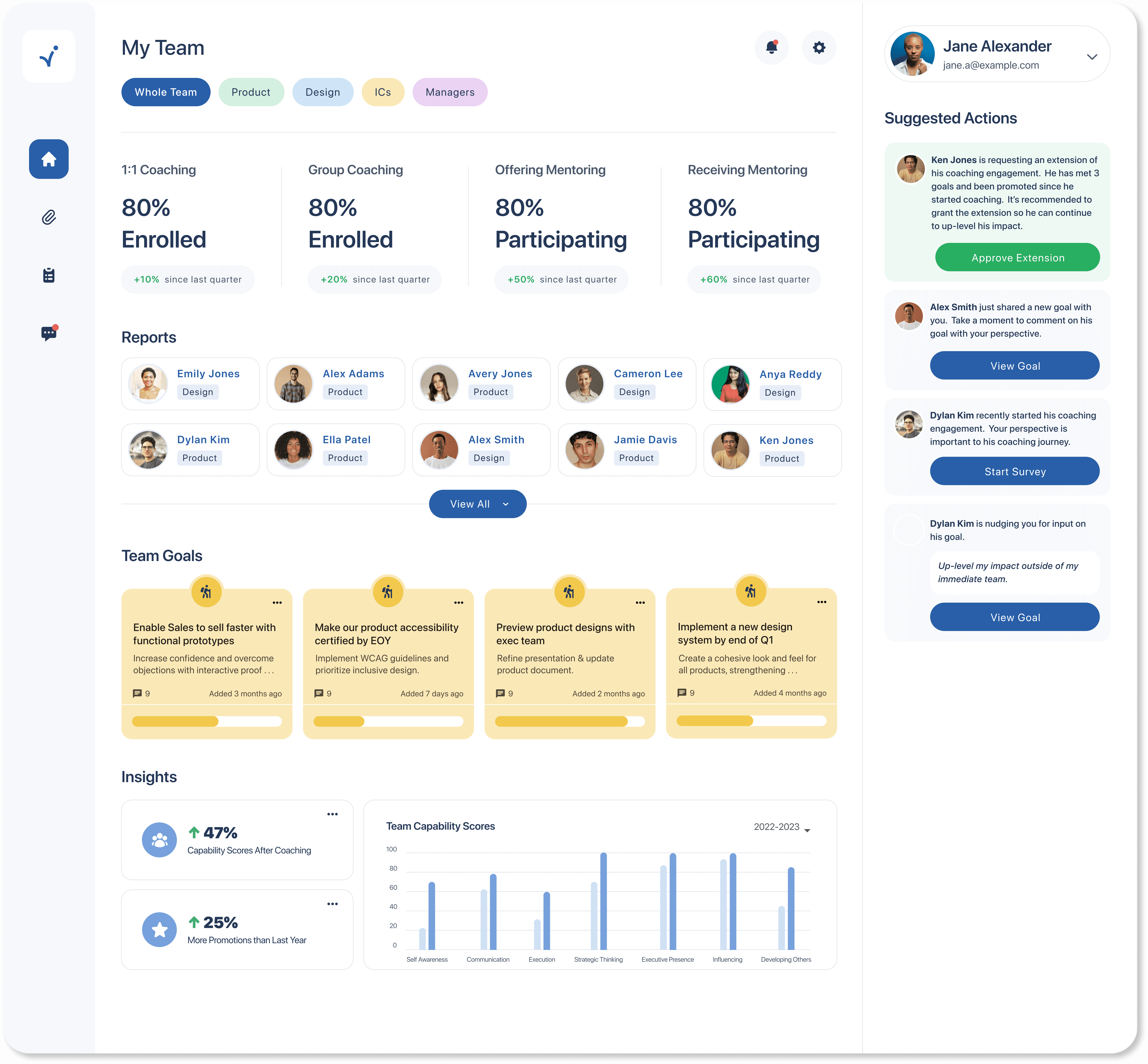CONTEXT
Sounding Board is a company in the leadership development space that offers customizable software to support coaching and mentoring engagements. The existing platform included clearly defined experiences for coachees and coaches, but not for the managers of coachees.
The company wanted to determine whether there was value in creating a dedicated manager UX. As a UXR intern, I produced this report, which has been condensed below.
Key finding
Managers are key players in a direct report’s leadership development and career journey. On the whole, direct reports indicated that it would be valuable to receive manager feedback in their coaching journey.
IMPACT
This research opened up a new growth opportunity for the company. A dedicated manager UX will empower managers to play a pivotal role in the leadership development of their direct reports on the SB platform.
INTRO
Sounding Board's software centers around the Leadership Roadmap (LRM), a place where a coachee’s goals, insights, and actions can be tracked.
There are three key players in a coaching engagement:
a coach (person who is providing coaching),
coachee/direct report (person who is receiving coaching)
the coachee’s manager (person who is overseeing the coachee’s day-to-day work at the company).
While there are clearly defined user experiences for the coach and coachee, there is no clear role for managers on the Sounding Board platform.
Managers on the platform could:
view and comment on a direct report’s LRM (if the direct report chooses to make them visible)
periodically complete checkpoint surveys to assess a direct report’s progress
We wanted to determine whether or not the company should invest in developing a robust and cohesive manager user experience, with a home page and features designed for specifically managers.
METHODS
We conducted 12 semi-structured interviews with direct reports and managers, and analyzed them through empathy mapping and affinity diagramming.
RESEARCH QUESTIONS
Career development: What role do managers play in their direct reports’ career development?
Manager value: What kind of value can managers offer as part of a coaching engagement? When would manager involvement be beneficial or detrimental?
Manager involvement: What do direct reports feel like is an appropriate level of manager involvement in their coaching journey?
Management style: What kinds of management styles do direct reports respond well to? What do direct reports value in a manager?
INSIGHTS
BUSINESS VALUE
Managers have a desire to invest in and support their direct reports’ career and personal development, and can provide a valuable “third party” perspective in a coaching engagement. However, they seem to be uncertain about how they should be using the Sounding Board platform to do so.
Direct reports want feedback about their goals and coaching engagements from their managers. However, they are often unsure how to request it, or do not receive it when they do.
Career growth conversations between managers and direct reports are typically taking place outside of the Sounding Board platform, which presents a key growth opportunity for the company.
There is value in providing opportunities for managers to become part of the coaching journey. However, to support coachees’ autonomy, the solution we implement must be flexible.
DESIGN RECS
Create a manager UX that provides clear opportunities for the manager to give feedback on their direct reports’ goals and progress.
Both of the external direct reports we interviewed were not aware of the ability to modify the visibility of their goals on the leadership roadmap. We recommended introducing hints in the UI to improve discoverability.
Include more concrete features that allow a coachee to specifically request feedback on their goals .
Offer more clarity about what role the manager should play in an engagement.
EARLY DESIGNS
Based on our design recommendations, Sounding Board designer Christina Chiocchi put together these early explorations of what a manager home page could look like.
Each direct report could have their own profile page with more detailed individual metrics.
FUTURE WORK
Our findings allowed us to refine the next set of questions we are interested in answering. As we continue to interview external stakeholders, we are interested in the following questions:
From the manager’s perspective, what features and functions might be useful throughout a coaching engagement? What kinds of data and insights would managers desire?
How can we create a clear understanding between all three parties (coach, direct report, manager) about what everyone is contributing to the coaching journey?
What kinds of feedback do direct reports want to receive from their manager in their coaching journey?
How can we mitigate concerns about privacy for the direct report?











